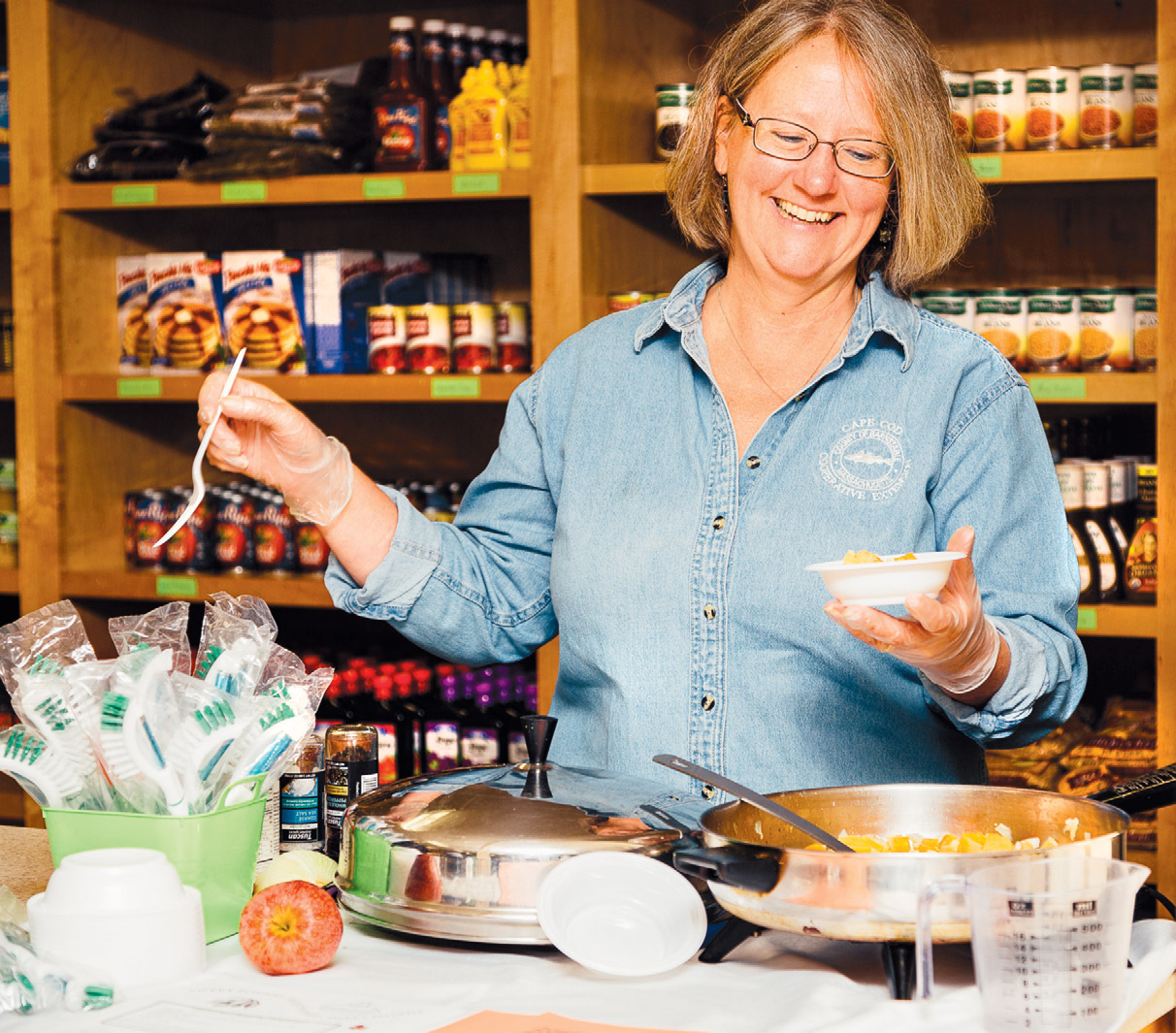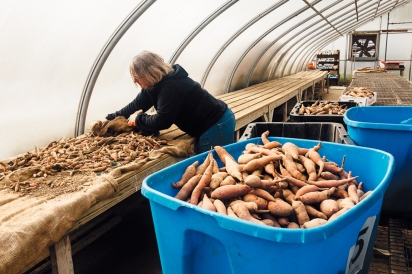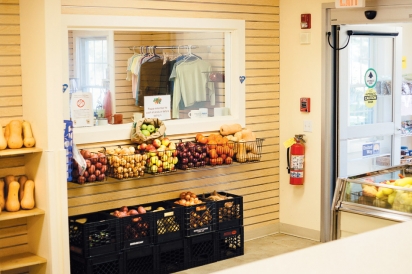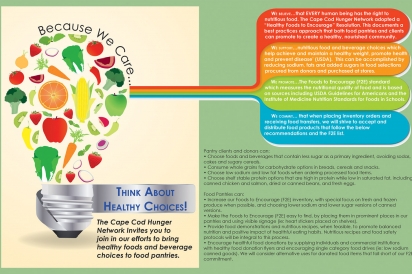Feeding the Community
On a warm October morning vans and trucks pull up from Cape Cod food pantries and supplemental nutrition programs to pick up plastic bins of sweet potatoes from Cape Cod Organic Farm in Barnstable. Earlier that day volunteers from Habilitation Associates and AmeriCorps groups from Wellfleet and Bourne brushed the dirt off 2400 pounds of sweet potatoes and loaded them into the bins. Grant money from Cape Cod Five Cent Savings Bank pays for the purchase of the seeds as well as the electricity to heat the greenhouse for five days to cure them, a process in which the harvested sweet potatoes are spread out on shelves where the heat dries and thickens their skin, extending their shelf life. Another 2400 pounds of butternut squash, also grown by farmer Tim Friary and already distributed to the pantries, underwent a similar process to seal the ends and harden the skin to maximize longevity.
The sweet potatoes are part of a Harvest for the Hungry initiative started by Cape Cod Cooperative Extension—the education arm of Barnstable County—and the Cape Cod Hunger Network. Kim Concra is both co-chair of the Hunger Network and part of a small team that comprises the Extension’s Nutrition Education Program, which has a stated mission to “provide individuals, families and communities with the knowledge and skills that empower them to make informed choices about healthy diets, efficiently manage food resources, and reduce the risks of chronic diseases and foodborne illness.” Concra works behind the scenes and on the ground to connect people with food and help make these types of initiatives happen. Friary has worked with Concra and the pantries for three years, growing sweet potatoes and squash on his farm, and prior to that he donated extra produce after a record season. This year Friary also donated 100 pounds of green beans to the pantries when the many volunteers who showed up for the sweet potato harvest helped him pick that crop, too.
Through her job at the Extension, Concra teaches ServSafe classes, required for all professional food handlers in the state of Massachusetts, and she educates preschoolers through adults Capewide about nutrition, food safety and cooking through programs, workshops and demos. After the sweet potatoes were distributed, she demoed a recipe for sweet potato hash at Falmouth Service Center. Along with samples of the hash, she handed out brush-peeler combo tools for cleaning and peeling, as well as sweet potato recipes, colorfully printed with nutritional information and various cooking methods. Other giveaways have included reusable shopping bags, small cutting boards and other useful food accessories that encourage people to eat well and sustainably. “Eating healthy food is preventative medicine,” Concra says. And she likes when pantry staff and volunteers try the recipes and are excited and informed about the various offerings. She also likes when people bring in their own recipes to share.
“I’m interested in giving people ideas on what they can make, or how they can prepare something,” Concra says. When there was an abundance of fresh kale, she did a demo to show that it is tasty and easy to make by sautéing it with apples to render it tender and sweet. She is a researcher and problem solver; around the holidays she provides suggestions for different ways a turkey can be cooked if, for instance, a family doesn’t have an oven to roast it in. She also has thousands of recipes saved on her computer for canned carrots, matzo lasagna and everything else that people might need ideas for.
In 2011 Concra created Cook Well, Eat Well, Live Well with Cape Cod Hunger Network and support from the Extension and the Bilezikian Family Foundation. The cookbook is a collection of easy-to-make, affordable and healthy recipes made with pantry-available foods. Each recipe includes nutrition information and the book is sprinkled with healthy tips and chef ’s suggestions: rinse canned beans before using to reduce sodium by 40%; lower sugar by substituting applesauce; or add more water, whole grains or vegetables to a recipe to increase the servings, fiber, vitamins and/or minerals. Concra is adamant that food safety is part of nutrition and the book opens with food safety information, including how to keep your family fed if the power goes out. The cookbook has had three printings and has been distributed to over 6000 people. “The good news is now there is more produce going to the pantries from Greater Boston Food Bank, community gardens and pantry plots,” she reports. She now envisions a new cookbook that covers choosing, storing and preparing fresh produce. “People are starting to cook again,” she says. “That makes me very happy!”
The Cape Cod Hunger Network helps support the pantries and supplemental nutrition programs with financial support and initiatives and is dedicated to coordinating food security programs throughout Cape Cod and the Islands. They pay the $400 per month cost of electricity to power the large refrigerators and freezers at Falmouth Service Center and Family Pantry of Cape Cod in Harwich where large donations from Greater Boston Food Bank and other donors come for distribution to the smaller pantries
The cookbook lead to another collaborative project, the Foods to Encourage program (see plaque on page 36), a commitment to providing increased access to fresh, locally grown produce that many pantries are successfully carrying out. As part of this program, nurses provide weekly health screenings to test blood sugar and blood pressure, there are food demos and other educational components, and each participant gets to take home a bag of fruit and vegetables. Normally individuals can only visit the food pantry once every two or three weeks, depending on the pantry, so Foods to Encourage is an additional weekly source of fresh produce as well as a time for participants, nurses and nutrition educators to gather and socialize.
Concra says the benefits of socializing around food are “contributing factors of the social determinants of health, which includes community and social connection as key factors to health equity.” Concra traces the origins of her interest in food and nutrition to growing up around her grandparents’ farm in upstate New York and then being aware of the difference when her family moved away and she no longer had access to those foods. She started her cookbook collection in high school, when she also started baking Anadama bread and received a book on holistic health, which she says, “really made sense to me.” While she was getting her college degree in nutrition, she lived with a family who followed a macrobiotic diet, which made her think about how different foods affect the body. She spent years working in restaurants and married a chef. She says, “I used to call myself a nutritionist with a baking problem,” but these days she bakes with almond and coconut flours to support family issues with gluten; her mother has celiac disease and her daughters have Crohn’s disease. She began beekeeping three years ago when her daughters limited their added sugar intake to maple syrup and honey. On her own, she also studies Functional Nutrition, a personalized approach, “which emphasizes the importance of high quality foods and phytonutrient diversity to address clinical imbalances and move individuals toward the highest expression of health.”
The efforts being made to get healthy and fresh food options into the pantries are evident at Falmouth Service Center where there is an onsite beehive to supply honey and a community garden that gives half of what is grown to the pantry. On an October day, wicker baskets hold bagged fresh oregano, shelves and bins are filled with apples, onions and Cape Cod Organic Farm’s butternut squash and sweet potatoes, and a display cooler bursts with Swiss chard, kale, summer squash, turnips and other colorful produce. The shelves are stocked with perfectly organized cans, bottles and boxes advertising low sodium, low sugar and whole grain foods. There is fruit spread rather than jam and all the juices are 100% fruit. A refrigerator is stocked with dairy and eggs and a freezer contains dogfish and chicken protein options. Local grocery stores participate in a meat rescue program in which they freeze meat as it nears its sell by date to prolong its shelf life for donation to the pantries. And Cape Cod Fishermen’s Alliance also collaborates to get skate, dogfish and other underutilized species of fish into pantries.
At 10 AM when the doors open, the pantry fills with people. The diverse mix of humans is a slice of everyone who lives on the Cape. MIT’s online Living Wage Calculator says that in Barnstable County, the living wage for one adult with two children is $31.95 per hour. With the state minimum wage at $10 per hour, the simple truth is that many of our family, friends and neighbors are not making enough money to feed themselves and their families adequately without help. According to Feeding America’s most recent 2015 data for Barnstable County, 9.4% or an estimated 20,080 people are food insecure, and Concra adds that a quarter of those without enough food in our communities are under the age of 18. “It used to be that food pantries were for emergency assistance, but with the cost of living on the Cape, it’s become part of people’s food budget,” she says.
In April 2017 the Massachusetts food stamp program, SNAP, added a three-year Healthy Incentives Program (HIP) to encourage participants to purchase local fruits and vegetables at participating farm stands, farmers’ markets and CSA programs. SNAP recipients get credited back the money spent on eligible purchases to their benefits card with monthly caps of $40, $60 or $80 depending on their family size. Concra says the program was slow to start, but after the first six months $1.6 million in benefits were earned statewide and local participating farmers have been pleased with the increase in their business. Through the Extension she has helped farmers navigate the process of signing up as HIP vendors and there is now at least one HIP vendor at every farmers’ market on the Cape.
The older demographic is one of the hardest to reach with supplemental nutrition services, “because they are people that were used to giving to the community, so it’s difficult for them to [ask for help],” Concra says. The Brown Bag Program delivers food directly to older people’s homes and to senior centers where it can be picked up, which has helped reach this population. Concra also cites limited public transportation on the Cape as an obstacle for some people to access available resources. She would love to see more consistency in the resources and services being offered in schools and pantries. She also envisions a stronger Hunger Network where representatives come together to communicate about what they are doing, ask questions, collaborate to solve problems and unify their efforts.
Concra is excited by the general resurging interest in food and sees many opportunities on the Cape for healthy eating and nutrition education. “I see more curiosity and interest in cleaner foods and I think there’s a greater awareness about processed foods,” she says. “We also have a very educated, especially older population who have access to information.” The types of calls and questions that the Extension gets have changed over her eleven-year tenure. Concra typically answers questions with more questions and frequently responds with, “it depends,” which is a testament to her belief that nutrition and health are individual and situational.
Food safety is more definitive and there is some critical information she wants everyone to know: food preservation recipes from earlier than 1994 should not be used due to newer science that helps prevent botulism; reheating cooked food that has been left out does not necessarily kill all the bacteria that may have formed; everyone should own a refrigerator thermometer; and do not wash chicken as it spreads bacteria.
As for the food pantries, Concra says that funding will always be an issue and donor fatigue is very real. January and February can be stark months following the generosity of the holiday season. She also reminds donors to “give healthy food that you would want to eat.”
capecodextension.org
capecodhungernetwork.org
livingwage.mit.edu/counties/25001








